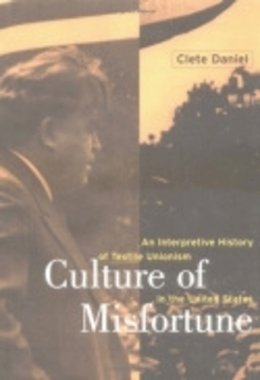
Culture Of Misfortucb
Culture Of Misfortucb
The failure of the Textile Workers Union of America to organize its jurisdiction has often been considered the CIO's most critical setback in establishing industrial unionism in the United States. The textile industry had more than 1,250,000 workers, and the massive organizing campaign the CIO launched in 1937 resulted in perhaps the longest, most bitter, and most significant labor-capital clash of the century.
In Culture of Misfortune, Clete Daniel integrates many primary sources, including extensive archival records and numerous oral interviews, into his examination of this conflict. He pays close attention to the internal political culture of the TWUA and how it was affected by the dislocation and transformation of the textile industry, the postwar assault on workers' rights, and the risks of activism in the face of the rampant anti-unionism of the South.
Daniel explains the inability of the TWUA to match the achievements of CIO unions in other mass-production industries through an analysis both of the internal dynamics of the organization and of the external political, social, and cultural impediments it confronted. He suggests that the multiplying difficulties that beset the TWUA predicted the challenges faced by all industrial unions in the last decades of the twentieth century.
Product Details
About Culture Of Misfortucb
Reviews for Culture Of Misfortucb
Martin Birt, University of Cape Town
The Journal of Industrial Relations
Daniel is masterful in interpreting efforts to unionize textile workers in the 20th century.... The book is strongest in delineating the divisions within national efforts.... Recommended for upper-division undergraduate through faculty collections.
Choice
Daniel relates this story with insight and sensitivity. He demonstrates his grasp of the historic dynamics of the American textile industry and the formidable obstacles that workers faced (and continue to face) in attempting to gain a collective voice.... Culture of Misfortune provides an interesting and controversial contribution to an important chapter in North America's labour history.
Jonathan Eaton
Relations Industrielles/Industrial Relations
Daniel's book is both a pleasure to read and fills in an important gap in the historiography of textile workers. It provides the first comprehensive history of the TWUA. While not a substitute for community studies, anyone undertaking a study of textile workers in the future will need to refer to this volume in order to gain an appreciation of how the union's internal politics effected its external relations.
Lawrence Richards, University of Virginia
EH.Net
This superbly researched and brilliantly written monograph tells a profoundly depressing tale, as its title indicates.... This is easily the best study of the TWUA to date. Culture of Misfortune is based on solid research in the union archives and wide knowledge of the secondary literature. It is also beautifully written, and in its connecting of the TWUA's problems with those of industrial unionism in general in the concluding years of the twentieth century, the book has a wide significance.
John Salmond, La Trobe University
The North Carolina Historical Review
Was industrial unionism the panacea that the Congress of Industrial Organizations (CIO) and those historians who praise it claim? Maybe not, suggests Clete Daniel.... His 'interpretive history' is short on glory and long on failure. Daniel persuasively argues that textile unionism was moribund from its inception.... He probably got it right in the book's early pages. Once the culture of misfortune became entrenched, all that was left to fight over was a pile of loose threads.
Robert E. Weir, Bay Path College
American Historical Review
